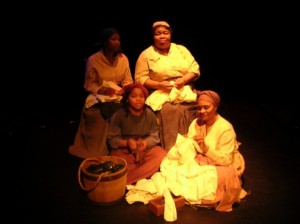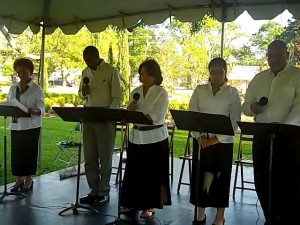Trust, Sensitivity, Respect - Terri Febuary, USA
To write plays with scenes of slavery requires trust from the actors and audience, sensitivity to the emotional histories and complete respect for all aspects of the subject, the culture, language, people and time period. Perhaps more than any other: respect for those who perform the harsh reality of their historic past.
Working with the subject of slavery started as a very challenging topic within the confines of a play, “Village on the Red”; which was written as a historical play of the founding of Alexandria, Louisiana from 1790 to 1830.
Research pulled up only one name of a slave, but there was a plethora of information regarding the people who owned slaves. It didn’t take much to connect the dots, but the question was: How to connect them without one group of audience members thinking I was “white-washing” the subject and others thinking I was trying to start a riot?
The answer is perhaps, because I am a white woman from Illinois, (Land of Lincoln) and my perspective came from a clear conscience or because I had been on stage with the actors who were available for the parts or because I didn’t relish alienating anyone in the community where I lived. Regardless, the scenes requiring black actors to look and work on stage as slaves required sensitivity. The entrances, exits, reason for their appearance and especially the dialogue and phrasing of each sentence had to be handled with respect.
Excerpt from the Slave Quarters scene:
FEMALE SLAVE 2: Missus don’t know the hurt of breakin’ up families when de be sellin’ the children, wife or husband…Some slave owners don’t think ‘bout it no more’n sellin’ livestock. Freedom…It be a deep hurt not to be free…freedom is always on the mind of us slaves. Those who can, take a chance to run. Freedom? It be in us jus’ the same as in them.
FEMALE SLAVE 1: I heard Dr. Sibley tell Missus dat no sick slave gonna do anybody any good. He say hurtin’ one a us is like killin’ a good mule hooked to a plow…
MALE SLAVE 1: …Yeah, well, you see how de’ whip a ole mule dat ain’t in mind to plow…
FEMALE SLAVE 1: …he say tenin’ to da health a dat mule make him want ta work cause he be workin’ for a carin’ Masser.
FEMALE SLAVE 2: Dey says lots a things ta keep us from runnin’ I still say a slave is a slave…
FEMALE SLAVE 3: …Yeah, an wit out his own papers he not any better’n a ole mule to talk about.
 So many aspects of slavery needed to be known; the “good masters”; the “bad masters”; Jim Bowie’s actions as a slave trader; religion; marriage; freedom. Then there is the question of: How many African-American actors could we find?
So many aspects of slavery needed to be known; the “good masters”; the “bad masters”; Jim Bowie’s actions as a slave trader; religion; marriage; freedom. Then there is the question of: How many African-American actors could we find?
I was not only the playwright for this play, but also the designated producer. Writing any scene for any play requiring black male actors was going to be a casting problem. The men who would perform were professionals. That first year I had to edit the script to fit women into the men’s roles. One of my actresses told me that her part didn’t seem right. She was following the Master around on stage and talking to him as a confidant rather than a slave. It was an important role, but it was a man’s role. The next year, we found a young man who could play the role. He missed most of the rehearsals because of sports and work, but he came through for us.
The actresses were willing to perform as slaves because they knew me and trusted me. They knew and trusted the director. The trouble came backstage with other performers creating an atmosphere where the women truly felt they were being treated as slaves. This deepened the performances of the black actresses, but they felt the heat of their ancestor’s breath, the pain of inhumanity and they refused to perform the roles the following year.
One of the actresses told a friend that, “Terri did a good job with the slave’s parts. She was sensitive and fair.” I repeat this not to pat myself on the back, but to relay the importance of being sensitive when writing.
The dialogue from Village on the Red-the Slave Quarters, rose out of the research and mental crafting a possible evening in the quarters. Recently, I was asked to write a slave history for a reading for the sesquicentennial of the Civil War. This honor required accurate, verbatim discourse for the sole Black History Event in our area. The title of the reading was, “Before the Freedom”.
I read many “ex-slave interviews” recorded by the WPA in the 1930’s; with respect to the material, I kept the dialect and language they used. Respecting the readers, committee leaders and audience, I carefully substituted the word, “nigger” with other names used by the interviewees, where possible. (I could not use the denigrating word easily because of my own feelings about it as well.)
I asked the readers specifically to comment on the script and the readers said that it was up to me as the writer. They accepted whatever was written. The wife and mother of two of the readers commented before the readings took place, “I have never been on a plantation and I never want to”, she said. Afterward she felt it learnt the perfect backdrop as it was the place where slaves had been in bondage before the freedom.
“Because you are from the North and have lived here in the south over thirty years, you bring a different perspective to the history of our people. You respect it.”, she told me.
Excerpt from “Before the Freedom”.
 MAN-2:
One day before the freedom, I heard something that sounded like-
ALL (In Unison): Thunder.
WOMAN-1: The war was begun and there were stories of fights and freedom. The news went from plantation to plantation. All the while the slaves acted natural and some even more polite than usual. They prayed for-
ALL (In Unison): Freedom.
MAN-2: Was I happy? Lord! You can take anything. No matter how good you treat it—it wants to be—
ALL (In Unison): FREE!
WOMAN-1: “…While equality has not reached the hearts and minds of all men in our country, those who will, press forward to establish respect for all mankind in each generation of black and white Americans. Recognition of the past and reconciliation in the present is the journey toward a truly free America.”
MAN-2:
One day before the freedom, I heard something that sounded like-
ALL (In Unison): Thunder.
WOMAN-1: The war was begun and there were stories of fights and freedom. The news went from plantation to plantation. All the while the slaves acted natural and some even more polite than usual. They prayed for-
ALL (In Unison): Freedom.
MAN-2: Was I happy? Lord! You can take anything. No matter how good you treat it—it wants to be—
ALL (In Unison): FREE!
WOMAN-1: “…While equality has not reached the hearts and minds of all men in our country, those who will, press forward to establish respect for all mankind in each generation of black and white Americans. Recognition of the past and reconciliation in the present is the journey toward a truly free America.”
TERRI ATKINS FEBUARY
Slave Narrative collection at the Library of Congress: http://memory.loc.gov:8081/ammem/snhome.html/ When I Was a Slave Memoirs from the Slave Narrative collection Edited by: Norman R. Yetman www.Doverpublications.com
I'm blown away by this Terri - how wonderful that you're tackling such an important issue, and how wonderfully you are doing so. We need to tread so lightly when we're working with material that is so sensitive - not only because it's painful history, but it's not our own. That makes it doubly important that we 'atone'...
J